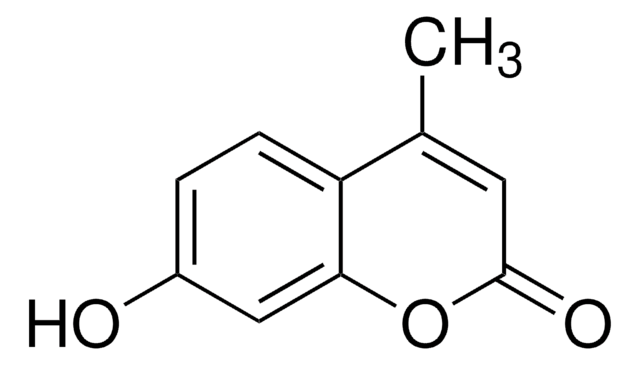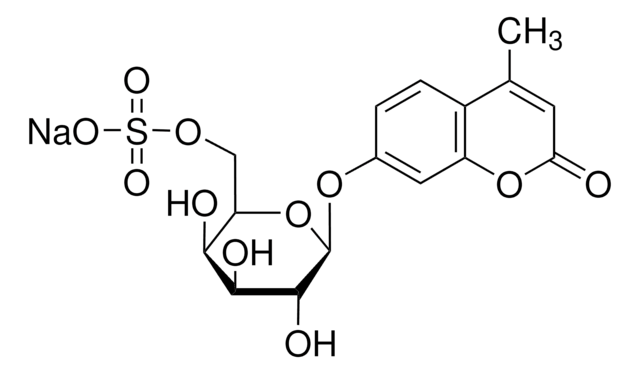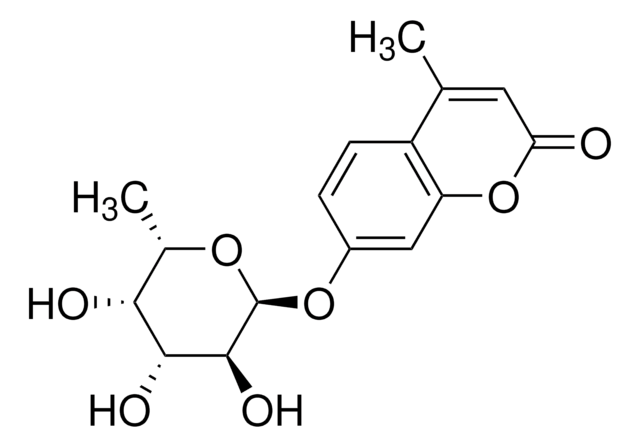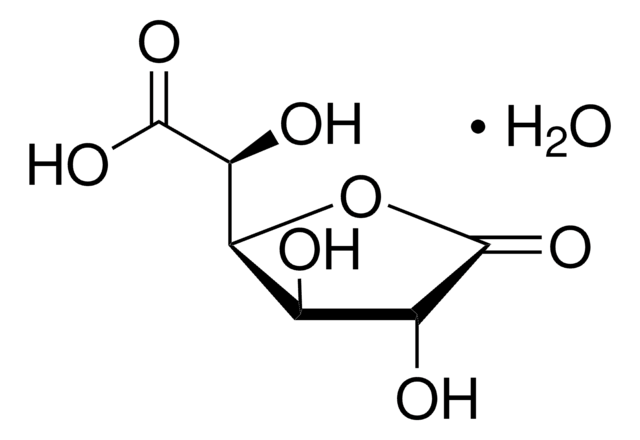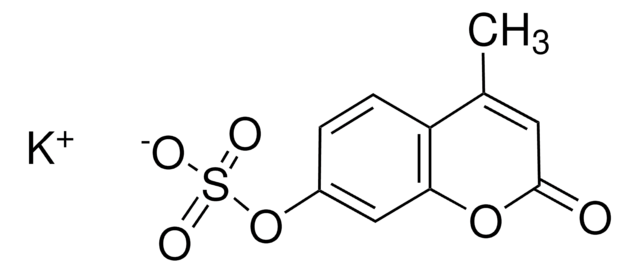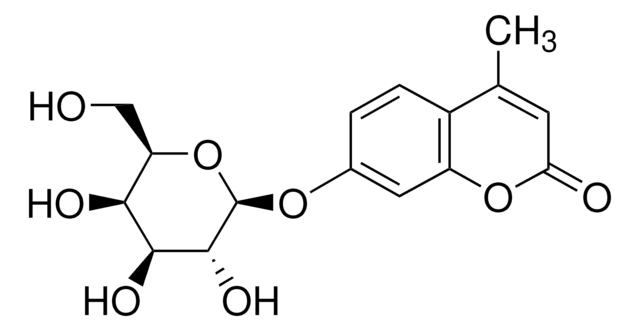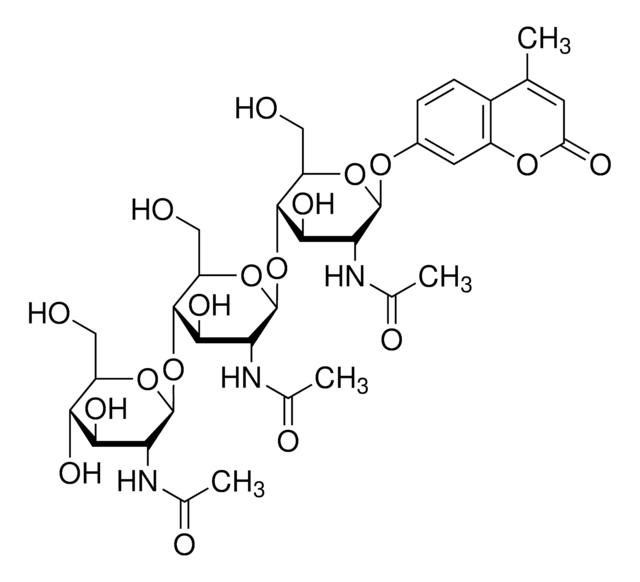Wszystkie zdjęcia(1)
Kluczowe dokumenty
I6034
α-L-Iduronidase human
recombinant, expressed in mouse NSO cells
Synonim(y):
IDUA
Zaloguj sięWyświetlanie cen organizacyjnych i kontraktowych
About This Item
Polecane produkty
rekombinowane
expressed in mouse NSO cells
Poziom jakości
Postać
solution
aktywność właściwa
≥7,500 units/μg protein
masa cząsteczkowa
83 kDa
zanieczyszczenia
≤1.0 EU/μg Endotoxin
Warunki transportu
wet ice
temp. przechowywania
−20°C
Opis ogólny
α-L-Iduronidase (IDUA) is mapped to human chromosome 4p16.3. The mature IDUA protein is glycosylated and comprises triosephosphate isomerase (TIM) barrel domain, β-sandwich, helix-loop-helix region and an immunoglobin-like domain. α-L-Iduronidase is classified under glycoside hydrolase (GH) family 39.
Zastosowanie
α-L-Iduronidase may be used for leukocyte assay in the study of a-L-Iduronidase deficiency in new born.
Działania biochem./fizjol.
In lysosomal degradation process α-L-Iduronidase plays a crucial role. It hydrolyzes the non-reducing terminal α-L-iduronic acid residues in glycosaminoglycans (GAGs), including dermatan sulfate and heparan sulfate.
Mutation in the α-L-Iduronidase is implicated in Mucopolysaccharidosis I (MPS I) . This enzyme defect leades to accumulation of dermatan and heparan sulfate . MPS I pathophysiology is accompanied with deformation of the skull, mental retardation and hernias.
Catalyzes the hydrolysis of unsulfated α-L-iduronosidic linkages in dermatan sulfate
Właściwości fizyczne
Expressed as C-terminal histine-tagged protein (residues 1-653) with a caluclated molecular mass of 71 kDa migrating at ~83 kDa under SDS-PAGE reducing conditions.
Definicja jednostki
One unit will produce 1 picomole of 4-methylumbelliferone from 4-methylumbelliferyl-α-L-iduronide per minute at pH 3.5 at 25 °C.
Postać fizyczna
Supplied as a solution in 40 mM sodium acetate , 400 mM NaCl and 20% (v/v) glycerol, pH 5.0
Ta strona może zawierać tekst przetłumaczony maszynowo.
Kod klasy składowania
10 - Combustible liquids
Klasa zagrożenia wodnego (WGK)
WGK 1
Temperatura zapłonu (°F)
Not applicable
Temperatura zapłonu (°C)
Not applicable
Certyfikaty analizy (CoA)
Poszukaj Certyfikaty analizy (CoA), wpisując numer partii/serii produktów. Numery serii i partii można znaleźć na etykiecie produktu po słowach „seria” lub „partia”.
Masz już ten produkt?
Dokumenty związane z niedawno zakupionymi produktami zostały zamieszczone w Bibliotece dokumentów.
Klienci oglądali również te produkty
Kristin D'Aco et al.
European journal of pediatrics, 171(6), 911-919 (2012-01-12)
Our objective was to assess how the diagnosis and treatment of mucopolysaccharidosis I (MPS I) have changed over time. We used data from 891 patients in the MPS I Registry, an international observational database, to analyze ages at symptom onset
Akemi Tanaka et al.
Molecular genetics and metabolism, 107(3), 513-520 (2012-10-02)
Hematopoietic stem cell transplantation (HSCT) has not been indicated for patients with mucopolysaccharidosis II (MPS II, Hunter syndrome), while it is indicated for mucopolysaccharidosis I (MPS I) patients <2 years of age and an intelligence quotient (IQ) of ≥ 70.
Ruben J Boado et al.
Bioconjugate chemistry, 24(1), 97-104 (2012-12-20)
The chronic administration of recombinant fusion proteins in preclinical animal models may generate an immune response and the formation of antidrug antibodies (ADA). Such ADAs could alter the plasma pharmacokinetics of the fusion protein, and mask any underlying toxicity of
Minke H de Ru et al.
Orphanet journal of rare diseases, 7, 22-22 (2012-04-25)
Mucopolysaccharidosis type I (MPS I) is traditionally divided into three phenotypes: the severe Hurler (MPS I-H) phenotype, the intermediate Hurler-Scheie (MPS I-H/S) phenotype and the attenuated Scheie (MPS I-S) phenotype. However, there are no clear criteria for delineating the different
Xu He et al.
Nature communications, 3, 1062-1062 (2012-09-20)
Lysosomal storage diseases are a class of over 70 rare genetic diseases that are amenable to enzyme replacement therapy. Towards developing a plant-based enzyme replacement therapeutic for the lysosomal storage disease mucopolysaccharidosis I, here we expressed α-L-iduronidase in the endosperm
Nasz zespół naukowców ma doświadczenie we wszystkich obszarach badań, w tym w naukach przyrodniczych, materiałoznawstwie, syntezie chemicznej, chromatografii, analityce i wielu innych dziedzinach.
Skontaktuj się z zespołem ds. pomocy technicznej